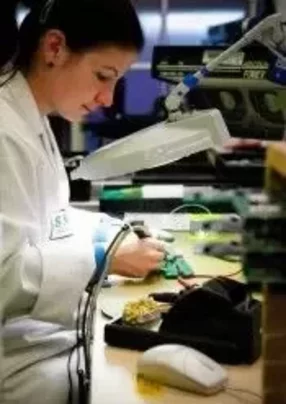SMS Electronics continues to diversify and develop solutions across a range of sectors and, having won the coveted Queen’s Award for Export in 2012, is targeting the award for innovation.
Among its exciting ongoing projects are x-ray sterilisation for medical equipment, human GPS tracking systems, smart metering for utilities companies and high-definition video conferencing.
These innovations showcase the company’s diversification from telecoms since 2002 when its management team created SMS after buying from Siemens the world class manufacturing facility in Beeston, Nottingham, in the UK.
Managing Director Mark Goldby, having worked at predecessor Siemens for 13 years, has been part of the journey from the very beginning.
“Our impressive technical pedigree runs back through several decades and our predecessor companies; the likes of GPT, GEC and Plessey were all here,” he said.
“These were fantastically innovative companies and we brought our skills and technical knowledge through those organisations to become SMS Electronics in 2002. It has been a very interesting journey in terms of acquiring new skills, new equipment and new processes.”
SMS, also named as the fastest-growing exporter in 2011, now operates across medical, utilities, military, sciences, security and industrial sectors, offering a full range of services including procurement, board assembly, test, product integration, asset management and end of life support.
Game changing
In the medical arena, the company is developing a low-energy x-ray sterilisation machine for vital equipment needed on the frontline of service delivery, providing an alternative to using high volume plants in select parts of the UK by allowing manufacturers to sterilise on-site themselves.
SMS is leading the consortium working on the project, which has received backing from the Technology Strategy Board (TSB) and will see a further 30-35 jobs created when the product becomes commercial following the 18-month evaluation and prototype programme.
“We are putting flexibility and agility into the supply model that medical device manufacturers currently use,” Goldby added. “If you look at some of the areas around the world that really struggle with sterilisation issues, whether it’s dirty water or dirty implements, there is huge demand.
“There are also thoughts of being able to develop a more portable unit or something that could be trailer based and driven into an area; this is one to watch.”
Diversifying
SMS Electronics’ repertoire expands into many other areas. For instance, it is selling thousands of human GPS tracking devices into care homes and police forces around the world, helping to keep them informed on where people of interest are at any given time.
It is a second generation, sleeker model, building on the older solution which comprised a bulky tag which could only be connected to a local base like a cordless house phone.
In the utilities sector, the company is deploying smart metres for providers to use on their own networks, as homeowners do with their own energy and water consumption.
“The information is collected by various nodes at strategic points in the network and is collated by a central database, which monitors and presents the data in a recognisable way,” Goldby said.
“These companies have a lot of regulation and targets to meet so it is vital their networks, some of which are very old, are monitored constantly to get the best out of them.”
Another area of rapid growth over the past five years, with the advent of high speed broadband, is high-definition video conferencing and SMS have manufactured the global market-leading product over this same timeframe.
Goldby added: “Low bandwith and high pixilation used to be the norm so this brought a new level of user engagement. The market has matured somewhat now and is in an interesting state of transition, especially with the explosion of cloud-based services.
“There are new players and technologies coming forward all the time so it will be a challenge for this product to stay ahead.”
Emerging Electronics
Staying ahead is what SMS’s biannual Emerging Electronics event, held for the second time earlier this year, is all about.
Bringing together suppliers, partners and customers, it gives industry experts a flavour of what tomorrow potentially holds, while also giving SMS the chance to showcase its facilities at Beeston. After being fully subscribed and receiving very encouraging feedback again, it is in the diary for 2016.
Goldby is equally passionate about being a part of his hometown Nottingham’s recent surge in business, especially in the clean and green tech fields, underlined by the company’s commitment to invest £1 million in upgrading its site in return for extending its lease by 10 years.
“We have a great geographical location within the UK and the Midlands,” Goldby said. “There is an international airport, freight terminal, great rail and road links which are being improved as we speak. There are also many large infrastructure projects going on in the East Midlands – Nottingham is a great place to do business!”
Rise of the apprentice
Developing a flexible culture and incorporating every employee into the SMS journey lies at the heart of future plans, and could ultimately help see the ambition of winning a Queen’s Award for Innovation realised.
Its 150 full time staff are trained and re-trained through the company’s in-house training centre, with 8-10 new apprentices being lined up for the coming year. In its fourth year, the apprenticeship scheme is a long term asset developer, and the future lifeblood of the company.
Goldby commented: “The quality of individuals applying is outstanding, and is coinciding with the majority of UK universities maximising their tuition fees.
“We are having to compete with the likes of Rolls Royce, Bombardier and Toyota in the East Midlands region to attract the best, but if you can get some good talent and give them a clear vision of what they can expect from the company and what we expect from them, then you can develop some real assets.”


